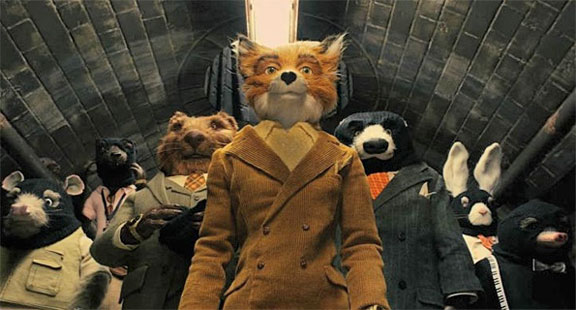 Thank god for Wes Anderson. Without his texture and quirky dry, deadpan writing, I would be searching for an antidote to all the Steven Spielberg I grew up on. Sure, ET and Indiana Jones were fun but I never saw the story-book worlds I grew up on brought to life in film ... until now.
Thank god for Wes Anderson. Without his texture and quirky dry, deadpan writing, I would be searching for an antidote to all the Steven Spielberg I grew up on. Sure, ET and Indiana Jones were fun but I never saw the story-book worlds I grew up on brought to life in film ... until now.Roald Dahl was my choice of childhood reading. He seemed to 'get' kids who were frustrated at adults doing stupid things like hunting (Magic Finger) and being mean (James and the Giant Peach). Fantastic Mr. Fox was a treasure. I just loved pouring over the pictures and wishing I could dig those amazing tunnels. I also loved just saying Boggis, Bunce, and Bean before I even knew what alliteration was. And while Dahl's 'people' books like Charlie and the Chocolate Factory could be made, and remade, into pretty good films, I never imagined his 'animal' books could come to life so well. But I never knew Mr. Anderson ... yet.
Mr. Fox is a fox, a wild creature, meaning you can't really expect him to behave against his nature, and his nature is to kill. Now when you have some nice hen houses and other easy prey, it's only natural he'll follow this nature and partake in the bounty before him. The story is simply a family man (Mr. Fox) with a dangerous scheme (robbing B,B, &B) that places his family and friends in harms way. Will they survive when the three Bs use every industrial device they have against them?
Anderson explores more of the 'human' conflicts through Mr. Fox. In his screenplay, Mr. Fox gets married due to an unplnned pregnancy and gets a respectable job as a journalist. How many kids stories rbing up such taboo subjects and even has charcters say things like, "I wish I hadn't married you." and banter about the trampiness of the maternal character in a very sympathetic way? Anderson also elevates other human conditions like parental expectations, sibling rivalries (cousins, in this case), and relationship quandaries. Yet even with such adult topics, Anderson keeps a kid-freindly tone my humorously avoiding curse words and substituting 'cuss' in their stead. This attention to detail in dialogue gives such levity to intense matters that the whole film seems alight with magic.
Baumbach & Anderson's screenplay makes many changes to Dahl's book yet all of them seem to mesh well with the media and time. I just loved the adventure of Mr. Fox vs. the dumb, glutenous, and power-hungry men who ran the town. The dialog zinged with spirit and digressions into existentialism, feats of athleticism, and poignant social observations ("But in the end, he's just another dead rat in a garbage pail behind a Chinese restaurant.").
I also enjoyed the use of stop-motion. The characters and process were refreshing throwbacks to a more classic time, when Dahl wrote, when computer animation and glossy post-production effects were unimaginable. Anderson still keeps his trademark sense of texture and set design with details like Mr. Fox listens listening to a WalkSonic player, the play-by-play for the game Whackbat, and Rat's Security tag. The dialog is wonderful and I kept thinking how succinct and smart some of these characters were ... then they'd revert to hissing and scratching - it's in their nature. Such contradictions in behavior - that couldn't be reflective of say Homo sapian behavior? What could we learn from Vulpus vulpus, except some fancy scientific terms for a few woodland creature? And how to ask Wolf about winter ... in French. Pensez-vous que l'hiver sera rude?
Well, I learned a little ... but mostly I was entertained and enchanted. The later is rarely achieved in movies these days. Now I want a bandit hat of my own, even if I have to find a really stretchy tube sock. I will wear it with pride until the DVD comes out, or Mr. Anderson takes me to another wild and fun place I've never been before. Anyone up for a game of Whackbat? I'll bring the pinecones.
No comments:
Post a Comment